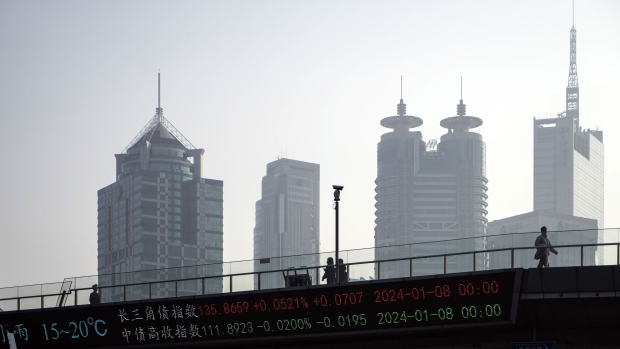Jan 17, 2024
China Stocks Slump as Concerns Mount on Disappointing Data
, Bloomberg News

(Bloomberg) -- A rout in Chinese stocks deepened Wednesday as a slew of disappointing economic data reinforced bearish sentiment toward the market.
The Hang Seng China Enterprises Index fell 3.9%, recording its worst day since October 2022. The CSI 300 benchmark for mainland shares slid 2.2% as foreigners sold 13 billion yuan ($1.8 billion) worth of stocks on a net basis, the most in more than a year.
Investors, already disheartened by a lack of interest-rate cut by the People’s Bank of China earlier this week, appeared to be throwing in the towel as data Wednesday showed persistent challenges from deflation pressures and the property crisis.
“It’s capitulation,” said Derek Tay, head of investments at Kamet Capital Partners Pte Ltd. “What started this week as an impasse from the PBOC has ballooned to concerns of economic risks, with the latest data dump further confirming the continued decline.”
READ: China’s Economic Growth Disappoints, Fueling Stimulus Calls
With key benchmarks in Hong Kong close to wiping out all gains seen since the late 2022 reopening frenzy, bewildered traders are left wondering where the bottom of this rout is. While some point to depressed valuations as reasons for at least a short-term rebound, sentiment is so weak that stimulus efforts aren’t enough to move the needle.
Stocks have continued to fall even after Bloomberg reported late Tuesday that China is considering 1 trillion yuan of new debt issuance under a so-called special sovereign bond plan as authorities seek more money to finance efforts to shore up the economy. Premier Li Qiang talked up the economy’s performance in Davos, saying how growth exceeded the target even without massive stimulus.
The Hang Seng China gauge is the worst-performing major benchmark globally this year with losses at 11%. That’s after four straight years of declines.
Leading Wednesday’s market losses were real estate developers. A Bloomberg Intelligence gauge of Chinese developers fell as much as 6.2% as the slump in home prices worsened.
Further compounding the outlook is the uncertainty over the US presidential election, which could flare up US-China tensions. Donald Trump signaled he would again make his stance on China a key part of his campaign strategy.
“Trump’s claim on China markets highlights the geopolitical risks and volatility in an US election year, where China could be a main talking point for both parties,” Marvin Chen, a strategist for Bloomberg Intelligence said.
--With assistance from Charlotte Yang, Zhu Lin, Jing Jin and Abhishek Vishnoi.
©2024 Bloomberg L.P.






